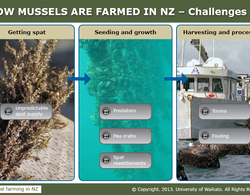Transcript
PROFESSOR ANDREW JEFFS
The presence of what we call fouling organisms, things like seaweeds and barnacles and sea squirts, on the mussels when they’re harvested causes quite a bit of a problem, because when they come in, you get a lot of other material mixed in with the mussels. Things like sea squirts in particular start rotting quite quickly and so that has the potential to cause spoilage.
Also the industry has been incredibly innovative and developed systems for opening mussels. And if you have a lot of barnacles on the outside of shells then it causes problems for some of those highly advanced systems for processing mussels.
There’s a machine which uses guided suction cups which sucker onto the outside of the shells and open the mussels. Well, if you’ve got barnacles on there, the suction cups can’t suck because there’s barnacles stuck underneath them.
The other issue with barnacles is our mussels have a beautiful green shell, and if they’re covered in barnacles, they don’t look as inviting as they do when they’re just that beautiful polished green jade colour.
ACKNOWLEDGEMENTS
Professor Andrew Jeffs, Oliver Trottier – Leigh Marine Laboratory, Auckland University.
Penny White.
Happy Aston.
NIWA.
Oliver Trottier


